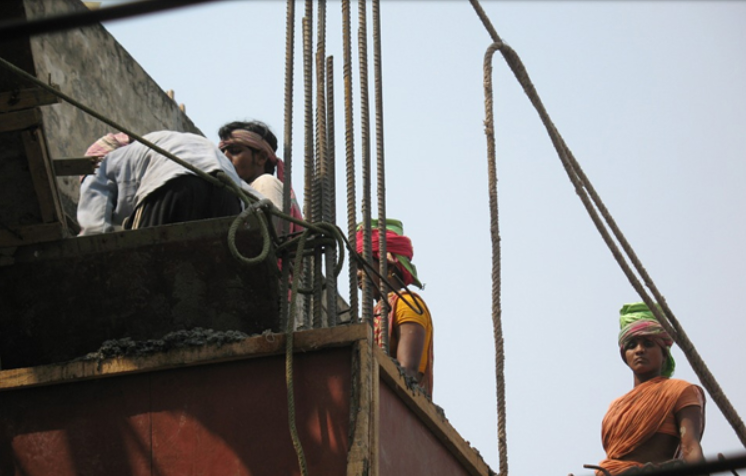|
A SMART WAY TO PREVENT BONDED LABOUR

Sunita Satnami was seven months pregnant when she and her husband, Ramesh Satnami, arrived in the Indian state of Andhra Pradesh to work in the brick kilns. With few job opportunities at home, they had left their village in the neighbouring state of Odisha after securing a 39,000 rupee (US$710) advance from their employer. The loan potentially locked them into a cycle of debt bondage that could be difficult to escape from.
When Sunita Satnami went into labour, doctors told her she needed a caesarean – which would have cost them 50,000 rupees (US$910). But instead of having to borrow even more money to pay the hospital costs, they were able to use a health insurance ‘smart card’ to pay the bill, thanks to an interstate agreement, drawn up with the help of the International Labour Organization. The smart card is provided under the federal Ministry of Labour and Employment's "RSBY"* national health insurance scheme.
“We are very poor and I was sure that my son and I would have died. It is a huge amount. It is good that the government has given us the card,” Sunita Satnami says.
Baby Rahul arrived safely. It was the first time the smart card had been used by migrant workers in Andhra Pradesh to access primary healthcare services.
“Neo” bondage
Traditional bonded labour – where whole families of peasant farmers were socially and economically dependent on their landlords down the generations – was officially outlawed in India in 1976.
However, the system evolved into a type of short-term “neo bondage”, based on financial transactions and most often affecting poor migrant workers like the Satnamis, who are involved in seasonal work.
During the off season, labourers take advances from their employers to help them pay bills at home. When the rainy season ends and the brick kilns open, they migrate to the kilns to work off the debt, in the hope that some money will be left out of their meagre wages.
It leaves workers open to exploitation: they are paid below the minimum wage, live and work in bad conditions and often are subject to violence. Sometimes they are still indebted when the job finishes and they return home. Needing access to finance for healthcare, school fees and daily living expenses – they become trapped in the cycle of debt.
To add to their vulnerability, migrant bonded labourers like the Satnamis normally have difficulties accessing basic health and welfare services in the states they move to temporarily. Often they do not know what services they are entitled to or where to find the money to pay for them.
In India's Tamil Nadu state, thousands of people desperate for money are offered advance payments to work in the region's many brick kilns. While this system has worked well enough in the past for both employers and workers, many workers run the risk of "debt bondage" because they cannot leave the worksite until they repay the advance in full. But the situation is changing now, by ILO working with government and employers, and showing workers how they can take more control of their own lives.
A preventative approach
The lack of social protection and the need for access to finance are some of the key issues tackled in the project “Reducing Vulnerability to bondage in India through the Promotion of Decent Work ” – a joint initiative between the ILO and the Ministry of Labour and Employment (MoLE).
By taking a preventative approach, the project’s aim is to reduce the conditions that perpetrate bondage-like conditions by promoting decent work, and by removing possible elements of bondage and coercion in the worker-employer relationship. It also involves inter-state coordination mechanisms for migrant workers, including workplace improvements, organization and unionization of workers and linking them to social security schemes.
In this case, the Satnamis benefited from a memorandum of understanding drawn up between the states of Andhra Pradesh and Odisha and the Ministry of Labour & Employment, with the help of the ILO. The smart card health insurance scheme (known locally as RSBY), allows migrant workers to access services without paying cash. They only need to pay 30 rupees (US$0.54) for the card.
“Social dialogue is an important aspect of this project,” says Tine Staermose, Director of the ILO’s Decent Work Team in South Asia.
“We work closely with government and social partners to improve the working and living conditions of workers. The model is sustainable as it uses locally available resources to break the debt-bondage cycle, promotes rights of workers, and enables their access to services and schemes. The positive results shown in Andhra Pradesh and Odisha have encouraged four more states to come forward and sign similar MoU’s.”
Anil Swarup, Director-General for Labour Welfare, says the MOU draws a clear roadmap for reducing workers’ vulnerability to bondage.
“The government clearly recognizes the need to tackle the scourge of bondage and is now evolving institutional structures to sustain the momentum and also to replicate this module in other parts of the country. The results so far have been extremely encouraging.”
Sunita and Ramesh Satnami say they do not want Rahul to work in the brick kilns. They dream of sending him to a good school in Odisha and hope he will become a government employee.
|




